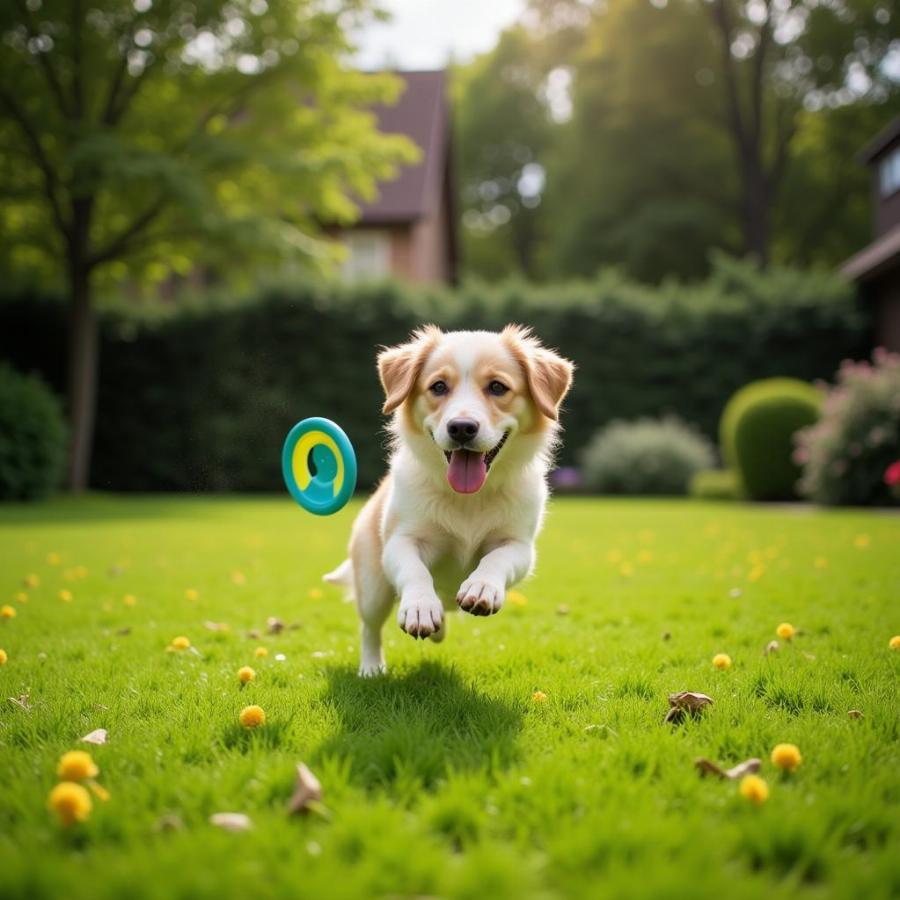Keeping your lawn lush and green shouldn’t come at the cost of your furry friend’s health. Many dog owners are unaware that common lawn fertilizers can pose serious risks to their beloved companions. From digestive issues to chemical burns, the potential dangers are real. So how do you balance a beautiful yard with the safety of your dog? This comprehensive guide explores everything you need to know about lawn fertilizer and dog safety.
Understanding the Hidden Dangers of Lawn Fertilizer
While seemingly harmless, many lawn fertilizers contain a cocktail of chemicals that can be toxic to dogs. These chemicals can be absorbed through the paws, inhaled, or ingested during everyday activities like playing fetch or simply rolling around in the grass.
Here are some common lawn fertilizer ingredients that can be harmful to dogs:
- Herbicides: Designed to kill weeds, herbicides can cause vomiting, diarrhea, and even more severe reactions in dogs.
- Insecticides: While targeting unwanted insects, insecticides can be extremely dangerous for dogs, potentially leading to tremors, seizures, and respiratory problems.
- Nitrogen and Phosphorus: Although essential for lawn growth, high concentrations of these can upset your dog’s stomach, and in extreme cases, lead to poisoning.
Signs Your Dog May Have Been Exposed to Toxic Fertilizer
It’s important to be vigilant and recognize the signs of potential fertilizer poisoning in dogs. If you notice any of the following symptoms, contact your veterinarian immediately:
- Vomiting
- Diarrhea
- Loss of appetite
- Lethargy
- Drooling
- Tremors
- Seizures
- Difficulty breathing
Choosing Dog-Safe Lawn Fertilizer
The good news is that you don’t have to sacrifice a healthy lawn for a happy dog. Many dog-safe lawn fertilizer options are available that effectively nourish your lawn without posing a risk to your furry friend.
Look for products that are:
- Organic: Organic fertilizers are derived from natural sources, such as compost or manure, and are generally safer for pets and the environment.
- Slow-Release: These fertilizers release nutrients gradually, reducing the risk of chemical burns and overexposure.
- Pet-Friendly Labeled: Opt for fertilizers that specifically state they are safe for pets.
Tips for Protecting Your Dog from Lawn Fertilizer
Beyond choosing the right fertilizer, there are several precautions you can take to minimize your dog’s exposure:
- Water After Application: Thoroughly water your lawn after applying any fertilizer to help dilute the chemicals and encourage absorption into the soil.
- Keep Pets Off the Grass: Prevent your dog from accessing the treated lawn for the amount of time specified on the product label.
- Store Fertilizer Safely: Store all lawn care products, including fertilizers, out of your dog’s reach in a secure location.
- Consider Alternatives: Explore pet-friendly lawn care alternatives like clover lawns, which are naturally resistant to weeds and require less fertilizer.
- Train “Leave It”: Teach your dog a reliable “leave it” command to prevent them from ingesting potentially harmful substances in the yard.
 Dog playing fetch on a lush green lawn
Dog playing fetch on a lush green lawn
Safeguarding Your Furry Friend
Protecting your dog from the potential hazards of lawn fertilizer is an important aspect of responsible pet ownership. By choosing pet-safe products, following application guidelines, and being aware of potential dangers, you can create a safe and healthy environment for your furry companion to thrive. Remember, a little vigilance goes a long way in ensuring your dog enjoys a long, happy, and healthy life.
FAQs about Lawn Fertilizer and Dogs
Q: Can I use weed and feed products if I have a dog?
A: It’s best to avoid weed and feed products as they combine fertilizer with herbicides, which can be harmful to dogs.
Q: How long should I keep my dog off the grass after fertilizing?
A: Refer to the specific product instructions for recommended waiting times, but generally, it’s best to wait at least 24-72 hours.
Q: What should I do if my dog eats fertilizer?
A: Contact your veterinarian or the ASPCA Animal Poison Control Center immediately.
Want to learn more about creating a pet-friendly lawn?
Check out these helpful resources:
- Best Grass Seed With Dogs
- Spots in Lawn From Dog Urine
- Dog Pee Repellent
- Patio Grass for Dogs
- Clover Lawn for Dogs
Beaut Dogs is your trusted source for all things dog-related. We provide expert advice and resources to help you navigate the joys and responsibilities of dog ownership. For personalized guidance on creating a pet-friendly environment, reach out to us at [email protected].